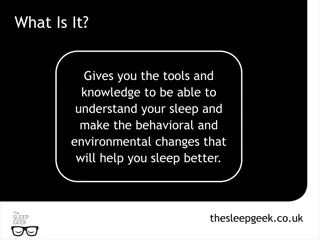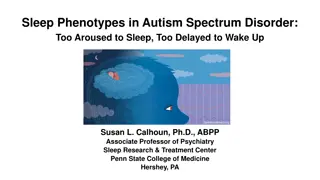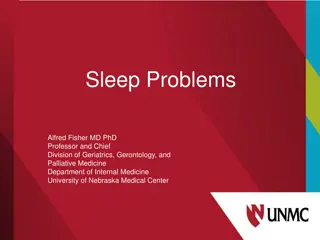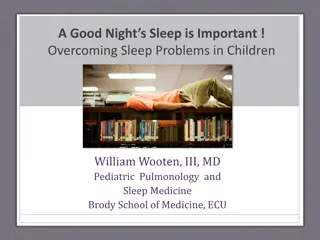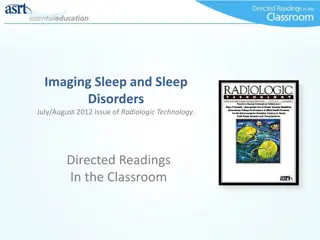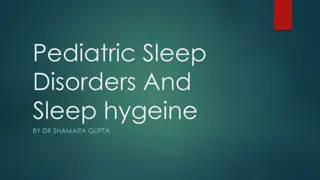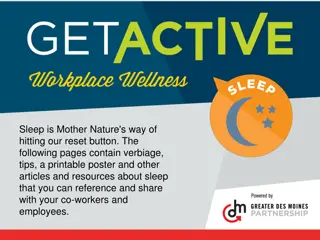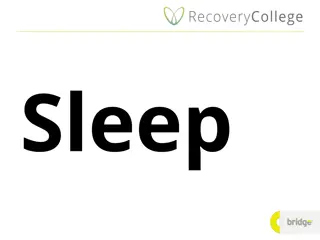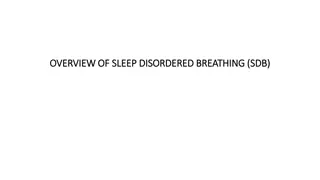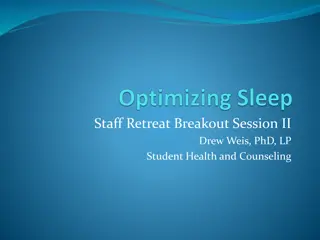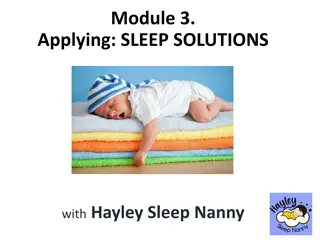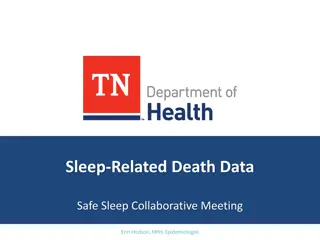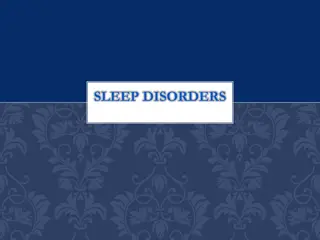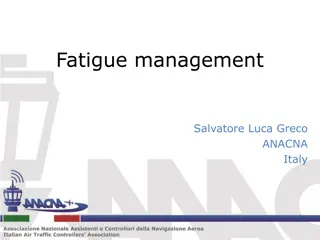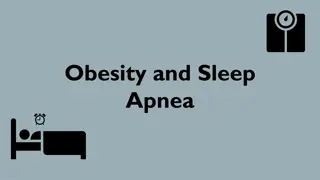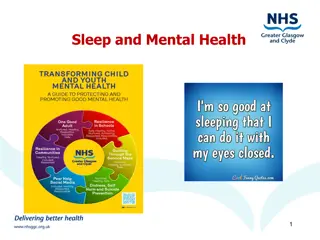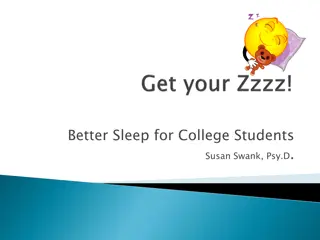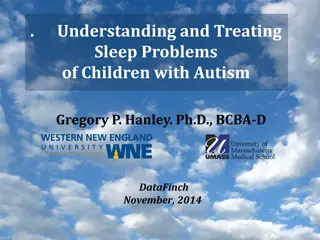Understanding the Effects of Sleep Loss on Performance
Effects of sleep loss include impaired mood, cognitive performance, and motor skills. Studies show that after prolonged wakefulness, performance declines, leading to increased medical errors, fatigue, and reduced vigilance. Sleep deprivation also affects memory, decision making, and task performance, highlighting the importance of recognizing signs of fatigue and implementing strategies to mitigate its impact.
- Sleep loss effects
- Performance degradation
- Cognitive impairment
- Fatigue mitigation
- Sleep deprivation consequences
Download Presentation

Please find below an Image/Link to download the presentation.
The content on the website is provided AS IS for your information and personal use only. It may not be sold, licensed, or shared on other websites without obtaining consent from the author. Download presentation by click this link. If you encounter any issues during the download, it is possible that the publisher has removed the file from their server.
E N D
Presentation Transcript
SLEEP LOSS AND WHAT TO DO ABOUT IT David J. Cipriano, Ph.D. Director of Student and Resident Behavioral Health Medical College of Wisconsin
Learning Objectives Increase awareness of signs of fatigue Understand the impact of fatigue on performance List fatigue mitigation strategies
Effects of Sleep Loss Impairment in mood, cognitive performance and motor skills are noted as one approaches 30 hours of wakefulness. After 10 hours of wakefulness, hourly declines in psychomotor performance are seen. By 17 hours of wakefulness, psychomotor performance is equivalent to that seen in alcohol intoxication. Tasks that require sustained vigilance are most vulnerable to sleep loss. Accuracy can be maintained, but at the expense of efficiency. Olson, Drage & Auger (2009). CHEST, 136(5).
Effects of Sleep Loss Medical errors Increased risk of sharps injuries Less participation in educational activities Durning et al. (2015), Military Medicine, 180(4): 129-135.
Effects of Sleep Loss Day-time somnolence Falling asleep while driving The effects are dose-dependent: percentage of medical errors goes up as the number of extended-duration shifts increases. Rosenbluth & Landrigan (2012). Ped Clin No Amer, 59(6): 1317-1328.
In addition, there are dose-dependent changes in: Attention lapses Depressed mood Reduced Cognitive Performance Olson, Drage & Auger (2009) CHEST, 136(5)
Neuropsychological Effects of Sleep Loss Impaired episodic memory encoding Decision making Divergent thinking fMRI shows decreased activation in prefrontal cortex. Durning et al. (2015). Military Medicine, 180(4): 129-135
Complex vs. Simple Tasks Degradations in performance are seen in both and are dose-dependent. Impact of sleep deprivation on complex tasks is less severe than on simple tasks. Wickens et al. (2015). Human Factors, 57(6): 930-946.
Other effects On the tail end of a long-call shift, residents reported less empathy toward their patients, which seems to have led to less patient-centered communication. Passalacqua& Segrin(2012). Health Communication, 27(5). Sleep-deprived pediatric residents were less patient centered in their communication Philibertet al. (2013). Annu. Rev. Med., 64: 467-83.
Sleep Loss and Mood Sleep loss co-occurs frequently with mood disorders. Sleep loss disrupts emotion regulation: Hyper-reaction in the amygdala to negative emotional stimuli has been observed with sleep loss. Decreased functional connectivity with the prefrontal cortex also observed in sleep deprivation. Thus, hyper-limbic reactivity combined with failure of top-down inhibition by the frontal lobe can lead to irritability and affective instability. van der Helm & Walker (2009)
Sleep Loss and Memory Sleep loss impairs next-day learning. van der Helm & Walker (2009) Sleep before learning is necessary for encoding of certain memories Sleep after learning is necessary for consolidation of certain memories Walker (2008)
Sleep Loss and Emotional Memory Whereas emotional arousal has enhancing effects on memory formation, sleep loss affects this in unique ways: Most profound impact is on positive emotional stimuli A somewhat lesser impact on emotionally neutral stimuli Negative emotional memories are more resistant to the effects of sleep loss Sleep deprivation reduces memories associated with positive emotions and leaves those tinged with negative emotions largely untouched.
Lack of sleep primes us for selective inclusion of negative experiences in our awareness So, we wake up tired and grumpy!
What do they mean by sleep deprivation? Restriction of sleep to 6 hours per night (or two hours less than normal) for just under 2 weeks. Olson, Drage & Auger (2009). CHEST, 136(5).
Signs of Sleepiness Irritability, moodiness Disinhibition Impaired memory retrieval Inflexible thinking Impaired planning skills Intrusive sleepiness
How good are we at judging our own sleepiness? Not very! Even as performance measures decline, subjects ratings of sleepiness suggest that they believe they are acclimating to sleep loss. Individuals may notice subjective feelings of sleepiness early on, but lose awareness of the progression of their fatigue and performance deficits as time goes on. Olson, Drage & Auger (2009). CHEST, 136(5).
So.. Ask your colleagues to help you monitor your fatigue.
Healthy Sleep Habits Try to go to bed and wake up at the about the same time on work days as well as non work days (keep it within an hour). Turn off electronics, especially hand-held devices 30-60 minutes before going to sleep (the light can suppress melatonin). As part of your bedtime routine, do something relaxing in the hour or so leading up to sleep such as reading or listening to music or a relaxation script.
Sleep Hygiene Establish a bedtime routine as on the previous slide. This should include no caffeine within 4-6 hours of bedtime, no alcohol 2 hours before bedtime, no heavy meals within 3 hours of sleep and avoid exercise within 3 hours of going to bed. Use the bed only for sleep and sex. Avoid naps if you are having trouble sleeping at night. If you are not asleep within 20-30 minutes, get out of bed and go do something relaxing in another room (read, mundane tasks, sedate television). Only return to bed once you feel sleepy. Don t watch the clock
Other tips Regular exercise Daily exposure to sunlight Healthy diet Judicious use of caffeine
Strategies for Extended Duration Shifts Take a nap before starting the first night shift. Try to increase hours of sleep on nights leading up to extended duration shifts. Programs offer a full 24 hours off after working a night shift. Rosenbluth & Landrigan (2012). Ped Clin No Amer, 59(6): 1317-1328.
Post Call Make time for sleep! Among many competing demands (work, family, community), it may be tempting to keep going the day after an over-night shift.
Steps to take if you recognize fatigue: Contact your Program Director or program leadership so that appropriate steps can be taken including: Provide coverage so you can sleep. Each MCWAH program has a contingency plan for continuity of care when housestaff is unable to perform their duties due to fatigue. Arrange safe transportation. All programs will reimburse for rides home if the resident is too tired. Identify available sleep rooms in the hospital.
Behavioral Health Services for Residents Intake Coordinator: Carolyn Bischel, MS, LPC: 414-955-8933 cbischel@mcw.edu Messages are confidential We maintain confidentiality from moment the phone call is made Messages returned within 1 work day Messages left after hours returned next day For emergencies, call 414-955-8900 and ask to have the clinician on call paged.


